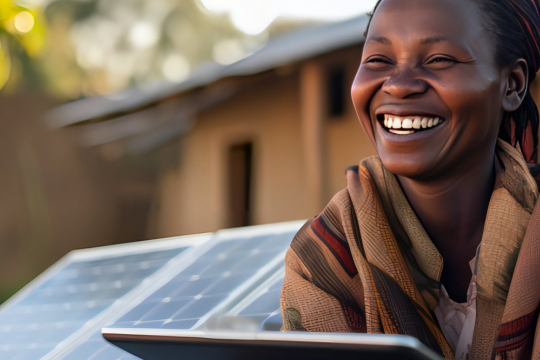A new study has shed light on the challenges and successes of Senegal's National Action Plan to integrate gender equality into its energy policies by examining the political and economic factors influencing the country's approach to gender mainstreaming in the energy sector.
EfD associates and SETI fellows Thomas Klug and Victoria Plutshack, EfD researchers Mawunyo Agradi and Sarah Appiah, with researchers Rajah Saparapa and Isaac Kwamena Nunoo conducted the study. They conducted 13 semi-structured interviews with key stakeholders. They reviewed relevant documents to understand how Senegal's economic and political structures, historical and social context, and the influence of key stakeholders shaped its efforts to mainstream gender in the energy sector.
The researchers found that the objectives of government, civil society, and development actors involved in policy development can be summarized as electricity access, economic development, access to clean fuels and technologies for cooking, and gender equity. The emphasis on energy access is reflected in the National Action Plan (NAP) and the government's long-term development agenda, but lack of engagement with the private sector has limited the policy's effectiveness in mainstreaming women across energy sub-sectors beyond clean cooking.
Important to combine political and economic factors
However, women's civil society organizations, historically less engaged with energy issues, have successfully advocated for increased women's political participation. This advocacy has paved the way for policies promoting "positive discrimination" for women and marginalized groups. This has been evident in policy activities aimed at electrifying women's economic sectors. The authors explain that such an approach of gender equity through ‘positive discrimination’ is most closely related to equality centered on difference as many political actors and international social actors, "implement energy access programs for the development of agricultural products companies (farming, fishing) managed by women" or "give priority to female candidates in vacancy notices".
The study highlights the importance of addressing both political and economic factors to include gender effectively in the energy sector. By understanding the interplay of these factors, policymakers and stakeholders can develop more inclusive and equitable energy policies.
Funding is a challenge
The NAPs require significant external funding, which is a major concern for stakeholders but, reliance on external funding can lead to foreign donors influencing policy outcomes.
Therefore, meaningful engagement with the private sector is crucial for ensuring equitable benefits from the low-carbon energy transition. Also, lack of funding for gender desks and expertise hinders mainstreaming efforts while the absence of gender-disaggregated data and infrastructure hampers evaluation.
Access “The political economy of gender mainstreaming in energy access in Senegal” here.
Gender mainstreaming has been embraced internationally as a strategy towards realizing gender equality. It involves the integration of a gender perspective into the preparation, design, implementation, monitoring and evaluation of policies, regulatory measures and spending programmes, with a view to promoting equality between women and men, and combating discrimination. Click here for more information on the subject.
By Belén Pulgar.
